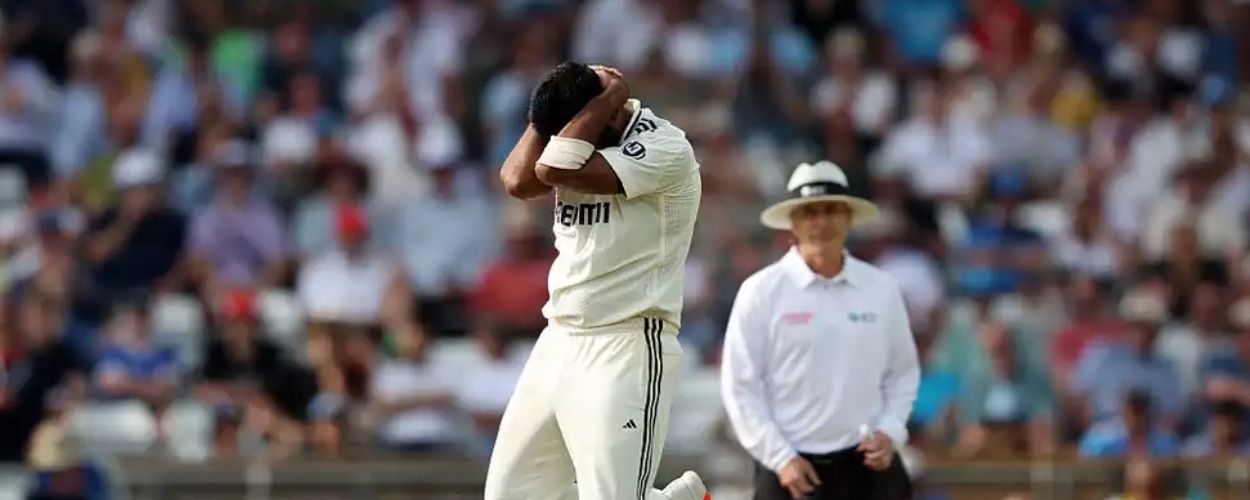A familiar pattern unfolded for India on the second day of the Headingley Test, one that reflected both promise and disappointment. As the post-Tea session began under overcast skies, Jasprit Bumrah walked in from fine leg to resume bowling. Each time, Karun Nair met him halfway to take his cap, a small ritual repeated almost superstitiously. The tension was unmistakable. England were 129 for 2, and India’s hopes of regaining control rested on Bumrah’s shoulders.
He nearly made it happen. Ollie Pope, well set on 60, was lured into a false shot by Bumrah’s unique angle. The ball flew to gully, but Yashasvi Jaiswal spilled the chance. It was the final ball of the 31st over. This time, the umpire returned the cap, and Bumrah buried his face in it in visible frustration. No one approached him—until Rishabh Pant jogged over to offer a comforting hug.
That single moment encapsulated India’s day. The chances came, but India failed to capitalize. When they needed to close the door, they left it ajar, offering England a way back into the match.
Up until that point, the match had belonged to India. At one stage, they were cruising at 430 for 3. It looked like they would dictate terms for the remainder of the Test. But then came a collapse: seven wickets for just 41 runs. India were bowled out for 471, a record for the lowest total to include three individual centuries. What should have been a commanding statement became a cautionary tale.
India has been in this position before. In Tests at Edgbaston in 2022 and at Hyderabad and Vizag in 2024, they had chances to put England away but fell short. At home, their bowling attack has been able to compensate. Away from familiar conditions, however, with Bumrah lacking a strong supporting cast, the margins are narrower, and the penalties are harsher.
Former Liverpool manager Jürgen Klopp once described gegenpressing as the best playmaker—not a person, but a style that stops the opposition before they start. That is exactly what India needed. England under Ben Stokes and Brendon McCullum play an aggressive, relentless brand of cricket. They chase, scrap, and thrive under pressure. The only way to contain them is to shut them down early.
India had the chance to do that in this match. The 471-run total was no small score, and batting coach Sitanshu Kotak termed the collapse as something that can happen. Ironically, it handed India the better bowling conditions as clouds rolled in over Headingley. Bumrah, who doesn’t rely on overhead help, used it to his advantage. He removed Zak Crawley in the first over and should have had Ben Duckett too, but a misfield from Jadeja gave him a reprieve.
England responded in their usual style—fast, direct, and aggressive. Duckett made a fifty, while Pope ended the day on a composed 100 not out. Around Bumrah, however, India’s bowling lacked bite. Prasidh Krishna and Shardul Thakur conceded 79 runs in just 13 overs. Krishna, still new to Test cricket, bowled too short on a pitch that demanded fuller deliveries. Thakur didn’t bowl until the 40th over and made little impact. Mohammed Siraj, after a slow start, showed promise in his later spells but could not break through.
Shubman Gill, in his first outing as on-field Test captain, had spoken about grabbing big moments. India had several, with bat, ball, and in the field, but failed to take advantage. Just before stumps, Bumrah returned for one last push. He dismissed Joe Root for the tenth time in Tests and nearly had Harry Brook, too, with a sharp short ball. But the joy was short-lived. The umpire called it a no-ball—Bumrah had overstepped.
That moment summed up India’s day perfectly. They were still ahead, but not by enough. They had pushed hard, but not quite far enough. The door wasn’t shut, and England, as always, were ready to walk through.






